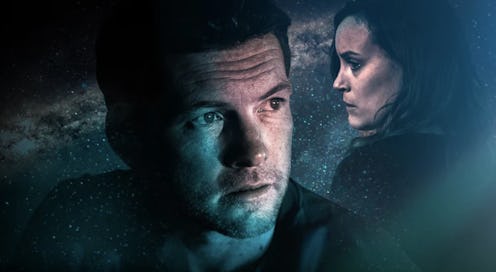Entertainment
Netflix’s New Movie About RoboHumans Isn’t Actually As Far-Fetched As It Seems

Netflix has been launching a barrage of new science-fiction content lately, with original series like Stranger Things and Altered Carbon and new movies such as The Cloverfield Paradox and Mute pretty much taking over the channel. And they're continuing that trend with their next blockbuster, The Titan, which sees an attempt to colonize Titan, a moon of Saturn, after the Earth's resources become depleted. But could people really live on Titan, or is this purely the stuff of science fiction?
The film doesn't really make the case that Titan could support human life; at least not without some modifications. The movie stars Sam Worthington as an Air Force pilot who is chosen to undergo a military experiment that will turn him into a superhuman capable of surviving on Titan; since the climate there is portrayed as far less hospitable than that of Earth. The experiment of course goes wildly wrong, as Worthington's character is transformed into a violent and uncontrollable mutant before ever even fulfilling his mission of being sent to Titan. The movie never claims that human beings could just happily set up a new society on Titan without these superpowered transformations, and real world science seems to back up the film's position. In other words, as far as we know, Titan would not be inhabitable for humans — at least not without some modifications.
If you were to attempt to just pack up and move to Titan without being adequately prepared for what awaits you there, you'd die pretty quickly. Titan is far colder than Earth, with a surface temperature around -290 degrees F. At that temperature, you wouldn't last very long. It's also impossible for liquid water to exist at that temperature, according to space.com. Titan also has an atmosphere that's about 95 percent nitrogen and 5 percent methane, meaning it's not breathable for humans, who require oxygen. But if you can find a way to get around the cold via a well-insulated space suit and equip yourself with an oxygen mask to solve the breathing issue, then Titan actually wouldn't be that bad of a place to live, all things considered. Plus, you'd have a pretty sweet view of Saturn, which would take up about half the sky.
Titan does have some attributes in its favor that actually make it the most hospitable place for humans in the outer solar system. It's atmospheric pressure is only about 1.5 times that of Earth, and its gravity is just a bit weaker than our moon's. Under these conditions, you wouldn't need a pressurized suit to survive, according to space.com, and you'd hypothetically be OK as long as you solved the temperature and breathing problems. Titan has a solid, rocky surface like Earth, and it is the only place in the solar system other than Earth with such a thick atmosphere. That atmosphere would protect you from the damaging radiation that is constantly striking the surface of just about every other heavenly body in outer space.
Titan is also the only other location in the solar system we know of that has liquid lakes and seas, according to NPR. They're filled with liquid methane and ethane instead of water, but still, its surface is much closer in structure to that of Earth than even Mars' surface, potentially making it a better candidate for human settlements. Plus, the abundance of methane and other hydrocarbons on Titan offer a ton of energy-creating potential, so there's no shortage of resources for a long-term colonization project, according to NPR.
As is, Titan could not support human life. But with enough of a support system, the moon of Saturn could eventually become a second home for humans — no unpredictable mutations required.